
Military police (MP) are law enforcement agencies connected with, or part of, the military of a state. In wartime operations, the military police may support the main fighting force with force protection, convoy security, screening, rear reconnaissance, logistic traffic management, counterinsurgency, and detainee handling.
In the United States, a special agent is an official title used to refer to certain investigators or detectives of federal, military, tribal, or state agencies who primarily serve in criminal investigatory positions. Additionally, some special agents operate in criminal intelligence, counterterrorism, or counterintelligence-based roles as well, with one or all of these roles occasionally taking precedence over criminal investigatory tasks.

The United States Naval Criminal Investigative Service (NCIS) is the primary investigative law enforcement agency of the U.S. Department of the Navy. Its primary function is to investigate major criminal activities involving the Navy and Marine Corps, though its broad mandate includes national security, counterintelligence, counterterrorism, cyberwarfare, and the protection of U.S. naval assets worldwide. NCIS is the successor organization to the former Naval Investigative Service (NIS), which was established by the Office of Naval Intelligence after the Second World War.
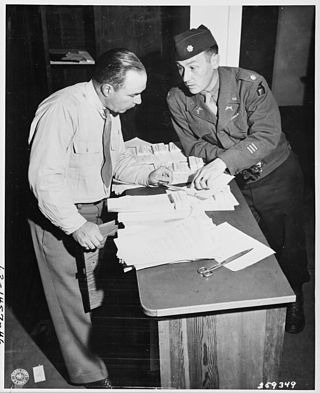
Provost marshal is a title given to a person in charge of a group of Military Police (MP). The title originated with an older term for MPs, provosts, from the Old French prévost. While a provost marshal is now usually a senior commissioned officer, they may be a person of any rank who commands any number of MPs; historically, the title was sometimes applied to civilian officials, especially under conditions of martial law, or when a military force had day-to-day responsibility for some or all aspects of civilian law enforcement. A provost marshal may also oversee security services, imprisonment, fire/emergency services and ambulances.
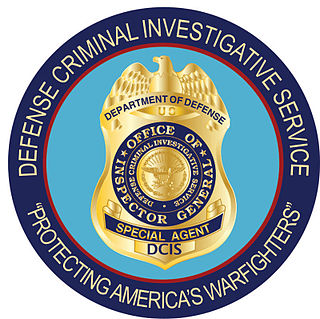
The Defense Criminal Investigative Service (DCIS) is the criminal investigative arm of the U.S. Department of Defense Office of Inspector General. DCIS protects military personnel by investigating cases of fraud, bribery, and corruption; preventing the illegal transfer of sensitive defense technologies to proscribed nations and criminal elements; investigating companies that use defective, substandard, or counterfeit parts in weapon systems and equipment utilized by the military; and stopping cyber crimes and computer intrusions.

The Federal Law Enforcement Training Centers serves as an interagency law enforcement training body for 105 United States government federal law enforcement agencies. The stated mission of FLETC is to "...train those who protect our homeland". Through the Rural Policing Institute (RPI) and the Office of State and Local Training, it provides tuition-free and low-cost training to state, local, campus and tribal law enforcement agencies.

A law enforcement officer (LEO), or police officer or peace officer in North American English, is a public-sector or private-sector employee whose duties primarily involve the enforcement of laws, protecting life & property, keeping the peace, and other public safety related duties. Law enforcement officers are designated certain powers & authority by law to allow them to carry out their responsibilities.
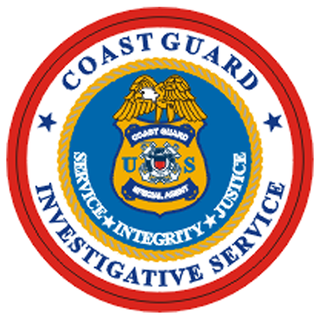
The Coast Guard Investigative Service (CGIS) is a division of the United States Coast Guard that investigates crimes where the U.S. Coast Guard has an interest. It is composed of civilian (GS-1811), active duty, reserve enlisted, and warrant officer special agents.
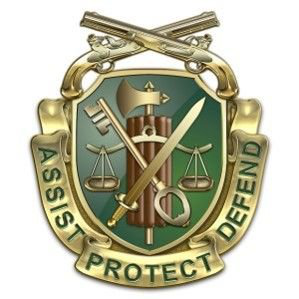
The United States Army Military Police Corps (USAMPC) is the uniformed law enforcement branch of the United States Army. Investigations are conducted by Military Police Investigators under the Provost Marshal General's Office or Special Agents of the Department of the Army Criminal Investigation Division (CID).

Coast Guard Intelligence (CGI) is the military intelligence branch of the United States Coast Guard, and a component of the Central Security Service of the United States Department of Defense.
The Criminal Investigation Task Force (CITF) is an organization created in early 2002 by the United States Department of Defense to conduct investigations of detainees captured in the War on Terrorism. It was envisioned that certain captured individuals would be tried by a military tribunal for war crimes and/or acts of terrorism.

The United States Department of the Army Criminal Investigation Division (CID), previously known as the United States Army Criminal Investigation Command (USACIDC), is the primary federal law enforcement agency of the United States Department of the Army. Its primary function is to investigate felony crimes and serious violations of military law and the United States Code within the US Army. The division is an independent federal law enforcement agency with investigative autonomy; CID special agents, both military and civilian, report through the CID chain of command to the CID Director, who reports directly to the Under Secretary of the Army and the Secretary of the Army. Unlike their counterparts at OSI and NCIS, Army CID does not have primary counterintelligence responsibilities.

Provosts are military police (MP) whose duties are policing solely within the armed forces of a country, as opposed to gendarmerie duties in the civilian population. However, many countries use their gendarmerie for provost duties.
A criminal defense lawyer is a lawyer specializing in the defense of individuals and companies charged with criminal activity. Some criminal defense lawyers are privately retained, while others are employed by the various jurisdictions with criminal courts for appointment to represent indigent persons; the latter are generally called public defenders. The terminology is imprecise because each jurisdiction may have different practices with various levels of input from country to country. Some jurisdictions use a rotating system of appointments, with judges appointing a private practice attorney or firm for each case.
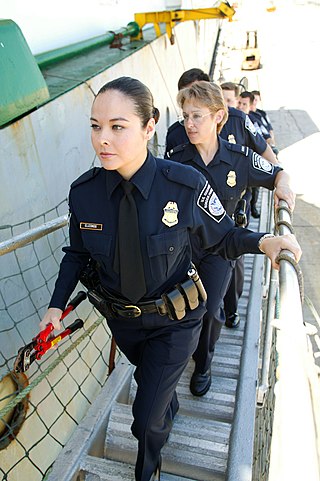
The federal government of the United States empowers a wide range of federal law enforcement agencies to maintain law and public order related to matters affecting the country as a whole.

United States Department of Defense police are the uniformed civilian security police officers of the United States Department of Defense (DoD), various branches of the United States Armed Forces, or DoD agencies.

The Department of the Army Civilian Police (DACP), also known as the Department of the Army Police, is the uniformed, civilian-staffed security police program of the United States Army. It provides professional, civilian, federal police officers to serve and protect U.S. Army personnel, properties, and installations. DACP personnel represent the Department of the Army's contribution to the Department of Defense Police program. DACP law enforcement officers primarily work alongside the U.S. Army Military Police Corps, the Army service members who hold law enforcement military occupational specialities. DACP officers are supplemented by Department of the Army Security Guards, who are uniformed and armed federal security officers, primarily responsible for entry control and basic security tasks. Although the Army Criminal Investigation Division employs civilian special agents, it does not fall-under the DACP nor DoD Police umbrella.

United States Army Counterintelligence (ACI) is the component of United States Army Military Intelligence which conducts counterintelligence activities to detect, identify, assess, counter, exploit and/or neutralize adversarial, foreign intelligence services, international terrorist organizations, and insider threats to the United States Army and U.S. Department of Defense (DoD).
The United States Department of the Navy Police is the uniformed security police program of the United States Navy. It provides professional, civilian, federal police officers to serve and protect U.S. Navy personnel, properties, and installations. DoN Police personnel represent the Department of the Navy's contribution to the Department of Defense Police program. DoN Police officers primarily work alongside U.S. Navy masters-at-arms, the military police of the U.S. Navy. Although under the Department of the Navy, the United States Marine Corps (USMC) maintains its own civilian law enforcement program for Marine Corps-centric installations, the USMC Civilian Police. Despite both employing civilian special agents, neither the Naval Criminal Investigative Service nor the USMC Criminal Investigation Division fall-under the auspices of the DoN/DoD Police; both agencies have their own chains of command.















